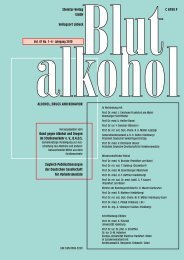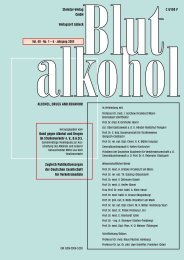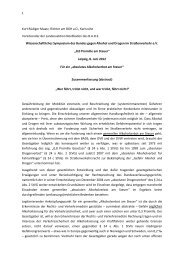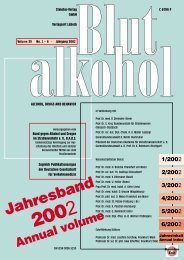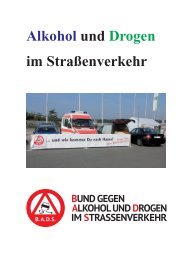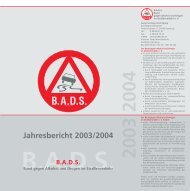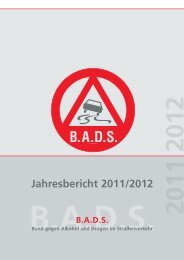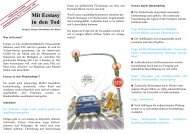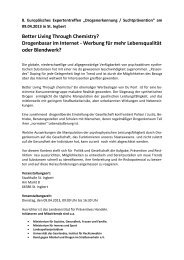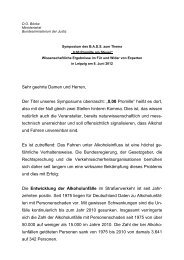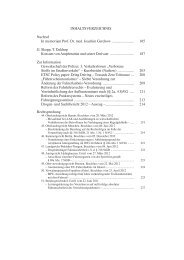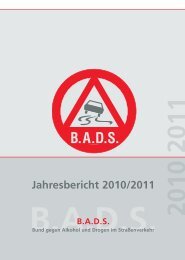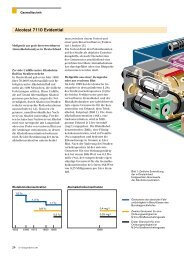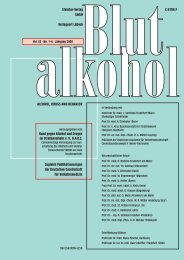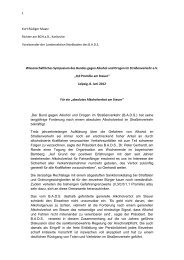- Seite 1 und 2:
Steintor-Verlag GmbH Verlagsort Lü
- Seite 3 und 4:
2 BLUTALKOHOL VOL. 42/2005 Inhalt d
- Seite 5 und 6:
4 BLUTALKOHOL VOL. 42/2005 Inhalt d
- Seite 7 und 8:
6 Autorenverzeichnis BLUTALKOHOL VO
- Seite 9 und 10:
8 Entscheidungsregister BLUTALKOHOL
- Seite 11 und 12:
10 Entscheidungsregister 11. OVG de
- Seite 13 und 14:
12 BLUTALKOHOL VOL. 42/2005 Rechtsp
- Seite 15 und 16:
14 BLUTALKOHOL VOL. 42/2005 Rechtsp
- Seite 17 und 18:
16 BLUTALKOHOL VOL. 42/2005 Rechtsp
- Seite 19 und 20:
18 BLUTALKOHOL VOL. 42/2005 Rechtsp
- Seite 21 und 22:
20 BLUTALKOHOL VOL. 42/2005 Rechtsp
- Seite 23 und 24:
22 BLUTALKOHOL VOL. 42/2005 Rechtsp
- Seite 25 und 26:
24 BLUTALKOHOL VOL. 42/2005 Rechtsp
- Seite 27 und 28:
26 Rechtsprechungsübersicht teilne
- Seite 29 und 30:
28 Rechtsprechungsübersicht 14. Ma
- Seite 31 und 32:
30 BLUTALKOHOL VOL. 42/2005 Rechtsp
- Seite 33 und 34:
32 BLUTALKOHOL VOL. 42/2005 Rechtsp
- Seite 35 und 36:
34 BLUTALKOHOL VOL. 42/2005 Rechtsp
- Seite 37 und 38:
Qualitätssicherung 20 Q R Rechtsme
- Seite 39 und 40:
2 Anteil als in den anderen Jahren.
- Seite 41 und 42:
4 Art des Verkehrsdeliktes 1996 199
- Seite 43 und 44:
6 Die geschlechtsabhängige Einsch
- Seite 45 und 46:
8 der Ordnungswidrigkeiten registri
- Seite 47 und 48:
10 Literatur 1) Bode H J Dräger Al
- Seite 49 und 50:
12 Für die folgende Untersuchung h
- Seite 51 und 52:
14 fährt, besucht ein Oberstufenze
- Seite 53 und 54:
16 Freizeit, Spaß und Frust Welche
- Seite 55 und 56:
18 Zusammenfassung Im Rahmen der Ze
- Seite 57 und 58:
20 Schmitt/Herbold/Aderjan, Wissens
- Seite 59 und 60:
22 SD wg SD bg SD t SD H Schmitt/He
- Seite 61 und 62:
24 Schmitt/Herbold/Aderjan, Wissens
- Seite 63 und 64:
26 Schmitt/Herbold/Aderjan, Wissens
- Seite 65 und 66:
28 Analyt Schmitt/Herbold/Aderjan,
- Seite 67 und 68:
30 Schmitt/Herbold/Aderjan, Wissens
- Seite 69 und 70:
32 Aus der Forschung BLUTALKOHOL VO
- Seite 71 und 72:
34 Aus der Forschung only taken can
- Seite 73 und 74:
36 Aus der Forschung Bundesstaaten
- Seite 75 und 76:
38 Zur Information Jahresbericht 20
- Seite 77 und 78:
40 Zur Information nis hervor, wobe
- Seite 79 und 80:
42 Zur Information nach Konsum nich
- Seite 81 und 82:
44 Zur Information Erstmals Zahl de
- Seite 83 und 84:
46 Zur Information Beschlüsse der
- Seite 85 und 86:
48 Rechtsprechung stehlichen oder i
- Seite 87 und 88:
50 Rechtsprechung zeitigen Freiheit
- Seite 89 und 90:
52 Rechtsprechung um das Wissen des
- Seite 91 und 92:
54 Rechtsprechung Foth, jeweils a.
- Seite 93 und 94:
56 Rechtsprechung Es ist zudem nich
- Seite 95 und 96:
58 Rechtsprechung Fahrerlaubnis ent
- Seite 97 und 98:
60 Rechtsprechung - Der Berufskraft
- Seite 99 und 100:
62 Rechtsprechung durch den Zusamme
- Seite 101 und 102:
64 Rechtsprechung In folgenden Ents
- Seite 103 und 104:
66 Rechtsprechung Vollgas“) des a
- Seite 105 und 106:
68 Rechtsprechung ne, sei zu befür
- Seite 107 und 108:
70 Rechtsprechung gebnisse erzwinge
- Seite 109 und 110:
72 Rechtsprechung StVG), sie hat ab
- Seite 111 und 112:
74 Rechtsprechung unter Alkoholeinf
- Seite 113 und 114:
76 Rechtsprechung tels in Rechtskra
- Seite 115 und 116:
78 Rechtsprechung ein Opfer Angehö
- Seite 117 und 118:
80 Rechtsprechung Mitteln der Allge
- Seite 119 und 120:
82 Rechtsprechung Straßenverkehrsg
- Seite 121 und 122:
84 Rechtsprechung Erweisen sich die
- Seite 123 und 124:
86 Um 2.00 Uhr konnte die 1. Bluten
- Seite 125 und 126:
88 Würde man Fall 2 nach Methode 1
- Seite 127 und 128:
90 Bei einem sehr negativen Wert er
- Seite 129 und 130:
92 Keywords drinking after the offe
- Seite 131 und 132:
94 Danach ist ein Zusammenhang zwis
- Seite 133 und 134:
96 gender Weise dargelegt. Danach s
- Seite 135 und 136:
98 StGB dann nicht mehr zulässig.
- Seite 137 und 138:
100 In Fällen, in denen der Täter
- Seite 139 und 140:
102 bei § 74 Abs. 1 StGB, alle Han
- Seite 141 und 142:
104 20 ) Der 5. Strafsenat allerdin
- Seite 143 und 144:
106 Zur Diskussion BLUTALKOHOL VOL.
- Seite 145 und 146:
108 Zur Diskussion Bindungswirkung
- Seite 147 und 148:
110 Zur Diskussion austausch muss s
- Seite 149 und 150:
112 Zur Diskussion Nach Rückverleg
- Seite 151 und 152:
114 Zur Diskussion eignungsmängel,
- Seite 153 und 154:
116 Zur Diskussion BLUTALKOHOL VOL.
- Seite 155 und 156:
118 Zur Diskussion Grundsätzen, da
- Seite 157 und 158:
120 Dokumentation BLUTALKOHOL VOL.
- Seite 159 und 160:
122 Dokumentation eine Steigerung d
- Seite 161 und 162:
124 Dokumentation nahmen (u.a. verd
- Seite 163 und 164:
126 Dokumentation dichten drohen. B
- Seite 165 und 166:
128 Dokumentation nicht über die B
- Seite 167 und 168:
130 Dokumentation Wir tun in Grenze
- Seite 169 und 170:
132 Dokumentation BLUTALKOHOL VOL.
- Seite 171 und 172:
134 Dokumentation deshalb verneint,
- Seite 173 und 174:
136 Dokumentation der eine nicht un
- Seite 175 und 176:
138 Dokumentation Durch Alkohol am
- Seite 177 und 178:
140 Dokumentation III. Empfehlung d
- Seite 179 und 180:
142 Dokumentation Verhalten konfron
- Seite 181 und 182:
144 Dokumentation 5) Empfehlung zur
- Seite 183 und 184:
146 Dokumentation Empfehlung der Ko
- Seite 185 und 186:
148 Nachruf Zum Gedenken an Prof. D
- Seite 187 und 188:
150 Nachruf Seit 1983 und bis 1999
- Seite 189 und 190:
152 Zur Information Die Europäisch
- Seite 191 und 192:
154 Zur Information Österreich: Vo
- Seite 193 und 194:
156 Rechtsprechung 16.*) 1. § 24a
- Seite 195 und 196:
158 Rechtsprechung nicht gibt und d
- Seite 197 und 198:
160 Rechtsprechung sie ihn vom Vorw
- Seite 199 und 200:
162 Rechtsprechung Die aufgrund der
- Seite 201 und 202:
164 Rechtsprechung sche konsularisc
- Seite 203 und 204:
166 Rechtsprechung rückgenommen h
- Seite 205 und 206:
168 Rechtsprechung stoßes gegen §
- Seite 207 und 208:
170 Rechtsprechung chung des Senats
- Seite 209 und 210:
172 Rechtsprechung bilden können,
- Seite 211 und 212:
174 Rechtsprechung sprechung aussch
- Seite 213 und 214:
176 Rechtsprechung Unter dem 02. 08
- Seite 215 und 216:
178 Rechtsprechung mender Pflichten
- Seite 217 und 218:
180 Rechtsprechung Demgegenüber f
- Seite 219 und 220:
182 Rechtsprechung haltspunkte für
- Seite 221 und 222:
184 Rechtsprechung geführt, die An
- Seite 223 und 224:
186 Rechtsprechung genkonsumbedingt
- Seite 225 und 226:
188 Rechtsprechung des Aktenvermerk
- Seite 227 und 228:
190 Rechtsprechung Nach § 3 Abs. 1
- Seite 229 und 230:
192 Rechtsprechung erlaubnis des An
- Seite 231 und 232:
194 Rechtsprechung Aus den Gründen
- Seite 233 und 234:
Breitmeier/Verner/Albrecht/Fieguth/
- Seite 235 und 236:
Breitmeier/Verner/Albrecht/Fieguth/
- Seite 237 und 238:
Breitmeier/Verner/Albrecht/Fieguth/
- Seite 239 und 240:
Fig. 4 Fig. 5 Fig. 6 Breitmeier/Ver
- Seite 241 und 242:
Breitmeier/Verner/Albrecht/Fieguth/
- Seite 243 und 244:
Breitmeier/Verner/Albrecht/Fieguth/
- Seite 245 und 246:
Seiten 209-217 Berg/Schubert, Aufme
- Seite 247 und 248:
Berg/Schubert, Aufmerksamkeitsdefiz
- Seite 249 und 250:
Berg/Schubert, Aufmerksamkeitsdefiz
- Seite 251 und 252:
Berg/Schubert, Aufmerksamkeitsdefiz
- Seite 253 und 254:
Literatur [1] Begutachtungs-Leitlin
- Seite 255 und 256:
Aus der Forschung unter Alkohol fah
- Seite 257 und 258:
Aus der Forschung vorgesehen. Die S
- Seite 259 und 260:
Seiten 223-231 Literatur Literatur
- Seite 261 und 262:
Literatur - Begutachtungs-Leitlinie
- Seite 263 und 264:
Literatur psychodiagnostische Infor
- Seite 265 und 266:
Literatur Ausführungen zu Unfallfl
- Seite 267 und 268:
Literatur Dem Abschleppen von Kraft
- Seite 269 und 270:
Zur Information Schweiz: Sondersteu
- Seite 271 und 272:
Zur Information „Alcokey“ soll
- Seite 273 und 274:
Senate umzustimmen, sollte angesich
- Seite 275 und 276:
Täter sich gelegentlich oder auch
- Seite 277 und 278:
manie der Angeklagten auf einer kra
- Seite 279 und 280:
- von der zufälligen zeitlichen Ko
- Seite 281 und 282:
Dem tritt der Senat nach eigener Sa
- Seite 283 und 284:
1. Das Verfahren der nach den §§
- Seite 285 und 286:
StPO) nicht gestützt werden (BVerf
- Seite 287 und 288:
menden Feststellungen der Strafkamm
- Seite 289 und 290:
Auf diese für die Beurteilung nach
- Seite 291 und 292:
gung der die Tat und den Täter ken
- Seite 293 und 294:
Mecklenburg- Vorpommern 1994 2002 2
- Seite 295 und 296:
P.-Straße, S.-Chaussee, K.-Weg und
- Seite 297 und 298:
52. Zusatztatsachen im Sinne von §
- Seite 299 und 300:
Vol. 42 (Supplement I) SYMPOSIUM DE
- Seite 301 und 302:
Supplement I GEORG MILBRADT Grußwo
- Seite 303 und 304:
Supplement I Nach Einschalten der Z
- Seite 305 und 306:
Supplement I [5] Qualification Test
- Seite 307 und 308:
Supplement I 2. Die Entwicklung von
- Seite 309 und 310:
Supplement I ist daher bisher nicht
- Seite 311 und 312: Supplement I rung von Autofahrten i
- Seite 313 und 314: egonnen werden; sie dürfen auch ni
- Seite 315 und 316: Supplement I WOLFGANG EISENMENGER R
- Seite 317 und 318: programms wie in Schweden könnte m
- Seite 319 und 320: Supplement I bloßen Sollvorschrift
- Seite 321 und 322: Supplement I an mehreren Stellen de
- Seite 323 und 324: Supplement I ERHARD OEHM Bemerkunge
- Seite 325 und 326: Kröner/Padosch/Lachenmeier/Madea,
- Seite 327 und 328: Kröner/Padosch/Lachenmeier/Madea,
- Seite 329 und 330: Kröner/Padosch/Lachenmeier/Madea,
- Seite 331 und 332: Kröner/Padosch/Lachenmeier/Madea,
- Seite 333 und 334: Kröner/Padosch/Lachenmeier/Madea,
- Seite 335 und 336: Verner/Schneider/Gebel/Panning/Wies
- Seite 337 und 338: Verner/Schneider/Gebel/Panning/Wies
- Seite 339 und 340: Verner/Schneider/Gebel/Panning/Wies
- Seite 341 und 342: Verner/Schneider/Gebel/Panning/Wies
- Seite 343 und 344: Verner/Schneider/Gebel/Panning/Wies
- Seite 345 und 346: Verner/Schneider/Gebel/Panning/Wies
- Seite 347 und 348: Klipp/Glitsch/Bornewasser/Dünkel,
- Seite 349 und 350: Klipp/Glitsch/Bornewasser/Dünkel,
- Seite 351 und 352: Klipp/Glitsch/Bornewasser/Dünkel,
- Seite 353 und 354: Klipp/Glitsch/Bornewasser/Dünkel,
- Seite 355 und 356: Klipp/Glitsch/Bornewasser/Dünkel,
- Seite 357 und 358: Klipp/Glitsch/Bornewasser/Dünkel,
- Seite 359 und 360: Klipp/Glitsch/Bornewasser/Dünkel,
- Seite 361: Klipp/Glitsch/Bornewasser/Dünkel,
- Seite 365 und 366: Seiten 303-310 Zur Information Inst
- Seite 367 und 368: Zur Information BAK von 0,3 ‰ ver
- Seite 369 und 370: Zur Information Darauf folgten Prä
- Seite 371 und 372: Zur Information sind. Die Bonner St
- Seite 373 und 374: Seiten 311-328 Rechtsprechung Die m
- Seite 375 und 376: 2. Während kein Anlaß besteht, de
- Seite 377 und 378: §§ 69, 69a StGB regelmäßig in B
- Seite 379 und 380: 54.*) Eine isolierte Sperre für di
- Seite 381 und 382: Unrecht einen Beweisantrag nicht ve
- Seite 383 und 384: Ergibt die Sachverständigenbegutac
- Seite 385 und 386: Eine Beschwer als Voraussetzung fü
- Seite 387 und 388: zu dieser Verordnung ohne weitere B
- Seite 389 und 390: Italien ausgestellten Führerschein
- Seite 391 und 392: Vol. 42 (Supplement II) GEMEINSAMES
- Seite 393 und 394: Supplement II JÜRGEN BRENNER-HARTM
- Seite 395 und 396: Supplement II Am Beispiel eines alk
- Seite 397 und 398: Supplement II Diese Befunde aus dem
- Seite 399 und 400: Supplement II Abb. 5: Dreidimension
- Seite 401 und 402: Supplement II Aus der Deutschen Ges
- Seite 403 und 404: Supplement II Adipositas, Fettleber
- Seite 405 und 406: Supplement II Ethylglucuronid (EtG)
- Seite 407 und 408: Supplement II Es sollten deshalb au
- Seite 409 und 410: Supplement II Ziele veränderter Be
- Seite 411 und 412: Supplement II [25] Reinhardt G (199
- Seite 413 und 414:
Supplement II 2. Warum ist es so sc
- Seite 415 und 416:
Supplement II Allerdings haben die
- Seite 417 und 418:
Supplement II schiedlichen Indikato
- Seite 419 und 420:
Supplement II Institut für Verkehr
- Seite 421 und 422:
Supplement II 4. Alkohol im Körper
- Seite 423 und 424:
Supplement II In einer weiteren Val
- Seite 425 und 426:
Supplement II [3] Feuerlein W, Küf
- Seite 427 und 428:
Supplement II Seit Inkrafttreten de
- Seite 429 und 430:
Supplement II • Qualifiziertes Pe
- Seite 431 und 432:
Supplement II schaftlich die umfang
- Seite 433 und 434:
Seiten 329-339 Glitsch/Klipp/Bornew
- Seite 435 und 436:
Glitsch/Klipp/Bornewasser/Dünkel,
- Seite 437 und 438:
Glitsch/Klipp/Bornewasser/Dünkel,
- Seite 439 und 440:
Glitsch/Klipp/Bornewasser/Dünkel,
- Seite 441 und 442:
Glitsch/Klipp/Bornewasser/Dünkel,
- Seite 443 und 444:
Glitsch/Klipp/Bornewasser/Dünkel,
- Seite 445 und 446:
Kunert/Löhrer, Neuropsychologische
- Seite 447 und 448:
Kunert/Löhrer, Neuropsychologische
- Seite 449 und 450:
Kunert/Löhrer, Neuropsychologische
- Seite 451 und 452:
Kunert/Löhrer, Neuropsychologische
- Seite 453 und 454:
Kunert/Löhrer, Neuropsychologische
- Seite 455 und 456:
Kunert/Löhrer, Neuropsychologische
- Seite 457 und 458:
Kunert/Löhrer, Neuropsychologische
- Seite 459 und 460:
Heinz Schöch, Probleme der Fahrsic
- Seite 461 und 462:
Heinz Schöch, Probleme der Fahrsic
- Seite 463 und 464:
Heinz Schöch, Probleme der Fahrsic
- Seite 465 und 466:
Heinz Schöch, Probleme der Fahrsic
- Seite 467 und 468:
Heinz Schöch, Probleme der Fahrsic
- Seite 469 und 470:
Heinz Schöch, Probleme der Fahrsic
- Seite 471 und 472:
Seite 367 Literatur Literatur KLAUS
- Seite 473 und 474:
Zur Information Alkoholverbot für
- Seite 475 und 476:
Zur Information Neue Promillegrenze
- Seite 477 und 478:
Zur Information Drogen- und Suchtbe
- Seite 479 und 480:
Seiten 375- Rechtsprechung Rechtspr
- Seite 481 und 482:
147/75 -; BGHR StGB § 239 Abs. 1 F
- Seite 483 und 484:
Zu keinem wesentlich abweichenden r
- Seite 485 und 486:
gegebenenfalls unter Berücksichtig
- Seite 487 und 488:
pes halbes Jahr nach dem Vorfall un
- Seite 489 und 490:
ne Entscheidung darüber zu treffen
- Seite 491 und 492:
Tages habe er dann den Wagen entwen
- Seite 493 und 494:
Anmerkung Wenn eine „Spritztour
- Seite 495 und 496:
weiteren Nachweisen). Vielmehr müs
- Seite 497 und 498:
koholkonzentrationen unter 1,1 ‰
- Seite 499 und 500:
genden Beweis für die Vermeidbarke
- Seite 501 und 502:
erlaubnis der Klasse B. Die Führer
- Seite 503 und 504:
angeordneten Überprüfung besteht
- Seite 505 und 506:
higung des Antragstellers genannt s
- Seite 507 und 508:
Zum Sachverhalt: Dem Kläger wurde
- Seite 509 und 510:
an der Verpflichtung des Beklagten
- Seite 511 und 512:
Aber nur zehn Monate nach diesem f
- Seite 513 und 514:
Nachdem der Antragsgegner mit Schre
- Seite 515 und 516:
jedenfalls nicht grundsätzlich ent
- Seite 517 und 518:
fristgerecht bei, so darf Letztere
- Seite 519 und 520:
a) Nach der Grundregel des § 28 Ab
- Seite 521 und 522:
VD 2004, 153 ; zweifelnd Otte/Kühn
- Seite 523 und 524:
Kündigung durch die Arbeitgeberin
- Seite 525 und 526:
Breitmeier/Besch/Gebel/Panning, Mea
- Seite 527 und 528:
Breitmeier/Besch/Gebel/Panning, Mea
- Seite 529 und 530:
Breitmeier/Besch/Gebel/Panning, Mea
- Seite 531 und 532:
Breitmeier/Besch/Gebel/Panning, Mea
- Seite 533 und 534:
Breitmeier/Besch/Gebel/Panning, Mea
- Seite 535 und 536:
Seiten 431-441 Trafkowski/Musshoff/
- Seite 537 und 538:
Trafkowski/Musshoff/Madea, Positive
- Seite 539 und 540:
Trafkowski/Musshoff/Madea, Positive
- Seite 541 und 542:
Trafkowski/Musshoff/Madea, Positive
- Seite 543 und 544:
Trafkowski/Musshoff/Madea, Positive
- Seite 545 und 546:
Trafkowski/Musshoff/Madea, Positive
- Seite 547 und 548:
Below/Rosenstock/Lignitz, Hanfprodu
- Seite 549 und 550:
Below/Rosenstock/Lignitz, Hanfprodu
- Seite 551 und 552:
Below/Rosenstock/Lignitz, Hanfprodu
- Seite 553 und 554:
Mengen enthalten sind. Auch ein exz
- Seite 555 und 556:
Briellmann/Sigrist, Umsetzung des r
- Seite 557 und 558:
Briellmann/Sigrist, Umsetzung des r
- Seite 559 und 560:
Briellmann/Sigrist, Umsetzung des r
- Seite 561 und 562:
Seiten 457-466 Zur Information Zur
- Seite 563 und 564:
Zur Information Begleitetes Fahren
- Seite 565 und 566:
Zur Information licher wissenschaft
- Seite 567 und 568:
Zur Information Zur Grenzwertproble
- Seite 569 und 570:
Zur Information von Bußgeldbehörd
- Seite 571 und 572:
Seiten 467-469 Laudatio Laudatio La
- Seite 573 und 574:
Laudatio Magazin gesendet und die H
- Seite 575 und 576:
Fundstücke Alkoholisierter Lkw-Fah
- Seite 577 und 578:
1 2 3 Seiten 473-510 76.*) 1. Artik
- Seite 579 und 580:
16 17 18 19 20 Fahrzeug eingestiege
- Seite 581 und 582:
Eine 45 Minuten nach der Tat entnom
- Seite 583 und 584:
eich begegnet die von dem Antragste
- Seite 585 und 586:
A u s d e n G r ü n d e n: Die sta
- Seite 587 und 588:
schläge zur Feststellung der zur T
- Seite 589 und 590:
Atemalkoholkonzentration von 0,29 m
- Seite 591 und 592:
Jagow in Janiszewski/Jagow/Burmann,
- Seite 593 und 594:
[= BA 2001, 373]; vgl. nunmehr DAR
- Seite 595 und 596:
gen des Urteils sind nicht Selbstzw
- Seite 597 und 598:
doch im konkreten Fall nach den üb
- Seite 599 und 600:
einschlägigen Bewährung und trotz
- Seite 601 und 602:
zeigt, spezielle Techniken der Selb
- Seite 603 und 604:
schlossen werden können (Achselhö
- Seite 605 und 606:
lung der Tat auszuschließen (hier:
- Seite 607 und 608:
Grundsätze zurückzugreifen. Danac
- Seite 609 und 610:
teln ist daher zweifelsfrei anzuneh
- Seite 611 und 612:
suchungsbeamten beizuwohnen und an
- Seite 613 und 614:
Werbeaussage immer noch in der ganz
- Seite 615 und 616:
Ersatzreststrafe herabgesetzt). Geg
- Seite 617 und 618:
Hinweise für Autoren Arbeiten übe
- Seite 619 und 620:
515 Additional requirements for sci



